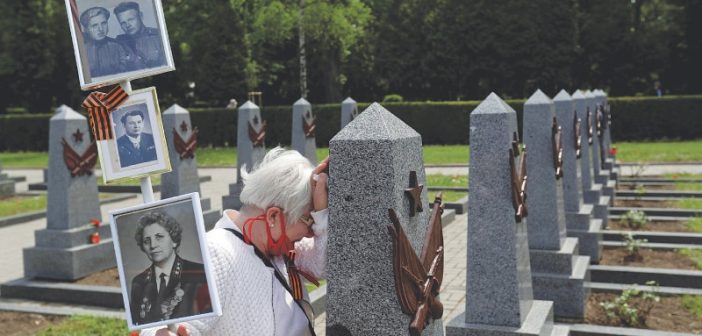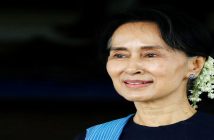She recalled the millions of people who died “so we could live as free people in a world of free nations”. “The greatest tribute to their sacrifice is that countries who were once sworn enemies are now friends, working side by side for the peace, health and prosperity of us all.
“Never give up, never despair — that was the message of VE Day,” she said. US President Donald Trump said the anniversary served as a reminder “that no challenge is greater than the resolve of the American spirit”.
“Over the past months, our nation has faced remarkable adversity during the coronavirus pandemic. But just as we have so many times before, America will triumph,” Trump said ahead of a small ceremony at Washington’s WWII memorial. In Berlin, German President Frank-Walter Steinmeier and Chancellor Angela Merkel stuck to social distancing guidelines as they laid down their wreaths.
In his speech, Steinmeier recalled how nations joined forces to fight the tyranny of Nazism and said the same unity was needed to defeat the virus. “For us Germans, ‘never again’ means ‘never again alone’,” he said. “We want more, not less cooperation in the world — also in the fight against the pandemic.”
British Prime Minister Boris Johnson also drew wartime parallels with COVID-19. “On this anniversary, we are engaged in a new struggle against the coronavirus which demands the same spirit of national endeavour that you exemplified 75 years ago,” he said in a letter to veterans.
Muted commemorations
The muted commemorations come as the continent grapples with its biggest crisis since World War II — this time an invisible enemy that has killed over 270,000 people worldwide.
In Paris, French President Emmanuel Macron attended a low-key ceremony at the Arc de Triomphe on a near-deserted Champs-Elysees avenue. Russian President Vladimir Putin, whose country celebrates Victory Day on May 9, recorded a special video message for the Austrian people to mark the anniversary, wishing them “peace and prosperity”.
“We are all fighting against this epidemic and mutual support is very important at this difficult time,” Putin said in the message shown on Austrian TV. Russia had originally planned a huge military display on its May 9 Victory Day, with world leaders including Macron on the guest list.
But now only a flypast will take place over the Red Square in Moscow, as the country becomes Europe’s new hotspot of coronavirus infections. Putin will on Saturday lay flowers at the Tomb of the Unknown Soldier memorial before making a TV address.
Immense gratitude
Germany does not usually mark the anniversary of the Nazis’ unconditional surrender to the Allies with much fanfare. This year however the city of Berlin declared a one-off public holiday on Friday.
President Steinmeier urged Germans to see May 8 as “a day of gratitude” because it freed Germany from the terror of the Nazis and brought peace to Europe. German Foreign Minister Heiko Maas also expressed “immense gratitude” to the countries that “accepted Germany back into the family of peaceful nations” despite its responsibility for the Holocaust, in wich six million Jews were killed.
But not everyone agreed with the tone of the commemorations in Germany. Alexander Gauland, a top figure in the far-right AfD party, slammed a suggestion to make May 8 a permanent public holiday, describing it as a “day of complete defeat” for Germany.
Josef Schuster, president of the Central Council of Jews, said Gauland’s view of the anniversary was typical of “neo-Nazis”. “The intention is to portray the Germans primarily as victims. I find this distortion of history and relativisation of Nazi crimes irresponsible,” he said. ♦




